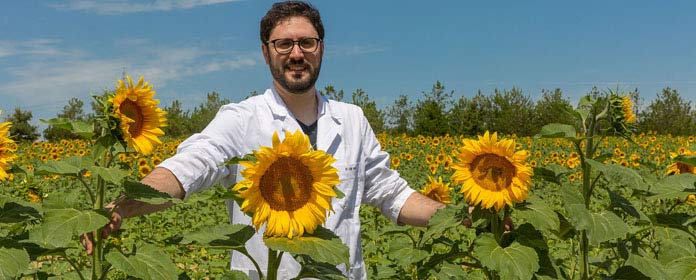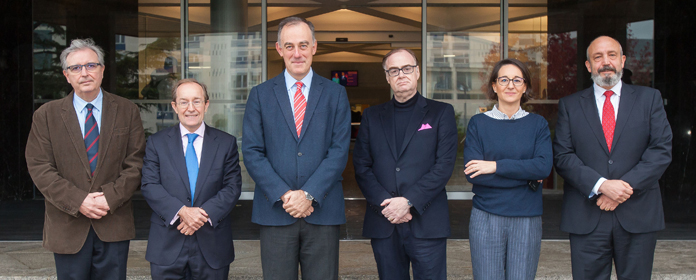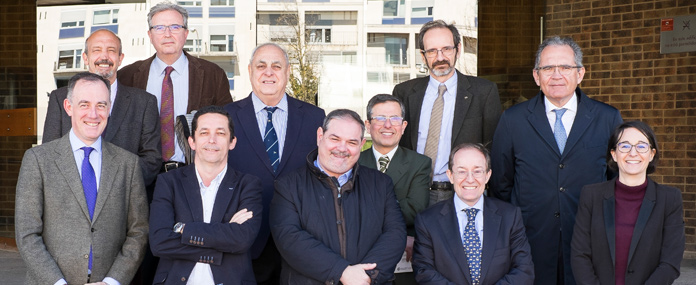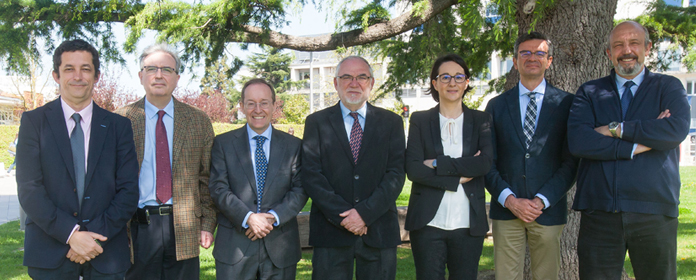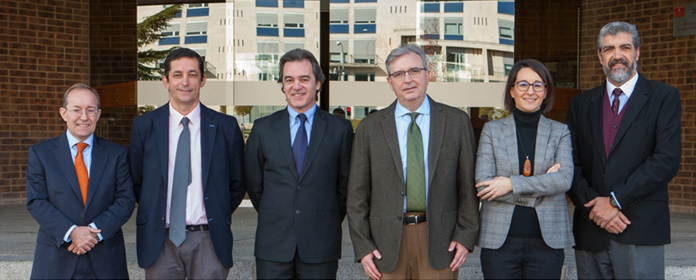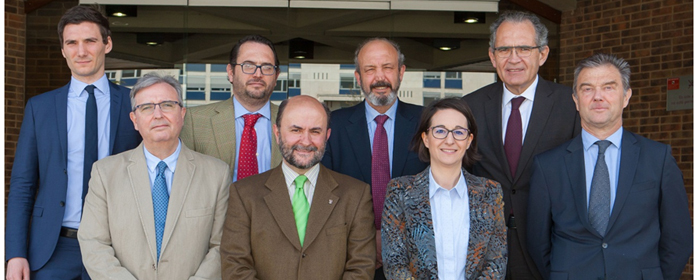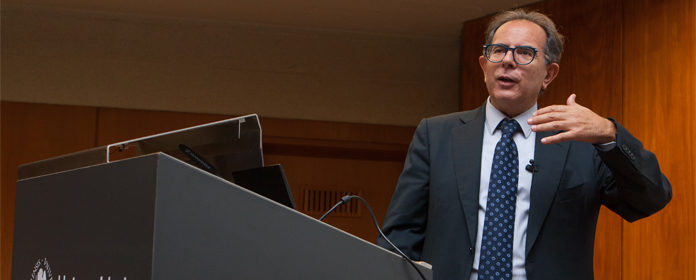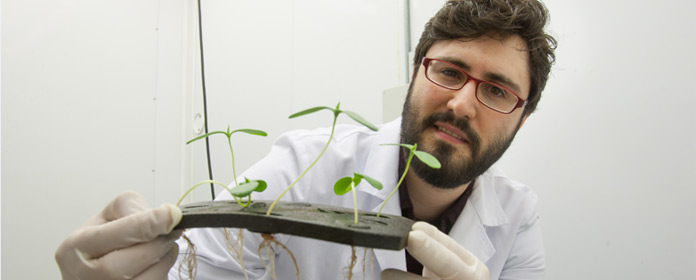The Chair Timac Agro regularly organises conferences given by internationally renowned personalities, both in the environmental and agricultural fields, as well as in other areas of science.
The "Albareda Lessons" are part of the Training Plan of the doctoral program in Natural and Applied Sciences of the University of Navarra and are open to professionals in the sector, related agents, teachers and researchers and the general public.
Albareda Lessons Calendar
speaker: Dr. Roberta Zambrini. Research Scientist at the Institute of Interdisciplinary Physics and Complex Systems (CSIC-University of the Balearic Islands).
Date: April 21.
Time: 12:00 p.m.
Location: auditorium. Science Library.
More information
speaker: Pedro Miguel Etxenique, Full Professor of subject Physics (UPV). award of Asturias award for research and Technical research .
degree scroll: "The sublime usefulness of useless science."
Date: February 24.
Time: 12:00 p.m.
Location: auditorium. Science Library.
speakerDr. Alessandro Piccolo. Full Professor of Agricultural and Environmental Chemistry at the University of Naples Federico II and award Chemistry of the Humboldt Foundation and honorary doctor by the University of Prague.
degree scroll of the lecture:"Humeome and humification. Story of a controversy".
Day: November 20.
Time: 12:00h.
Place: auditorium. Science Library.
speakerDr. Sara García Alonso. Degree in Biotechnology (2012) and Master's Degree in Biomedical research (2013) from the University of León, and in 2018 she received her PhD in Molecular Biology from the University of Salamanca.
degree scroll of the lecture:"Biotechnology: from the laboratory to outer space".
Day: February 26.
Time: 12:00h.
Place: auditorium. Sciences Building.
speakerDr. Juan Luis Arsuaga. Full Professor of Human Paleontology at the Complutense University of Madrid and award Prince of Asturias for Scientific and Technical research 1997.
degree scroll of the lecture:"Our body, 7 million years of evolution".
Day: February 21st.
Time: 12:00h.
Place: auditorium. Sciences Building.
speakerDr. Roberto Solano. Professor of research of the National Center of Biotechnology (CNB), CSIC.
degree scroll of the lecture: "Biosynthesis, mode of action and evolution of jasmonates in plants".
Day: March 30.
Time: 12:30h.
Place: auditorium. Building Science Library.
Speakers: Antonio Regalado, Senior publisher, MIT Technology Review; and Lluis Montoliu, researcher of CNB-CSIC.
degree scroll of the lecture:"CRISPR: modifying the human genome?".
Day: February 24.
Time: 12:30h.
Place: classroom 3E02 of Sciences Building.
moderatorJavier Novo , Full Professor of Genetics. University of Navarra.
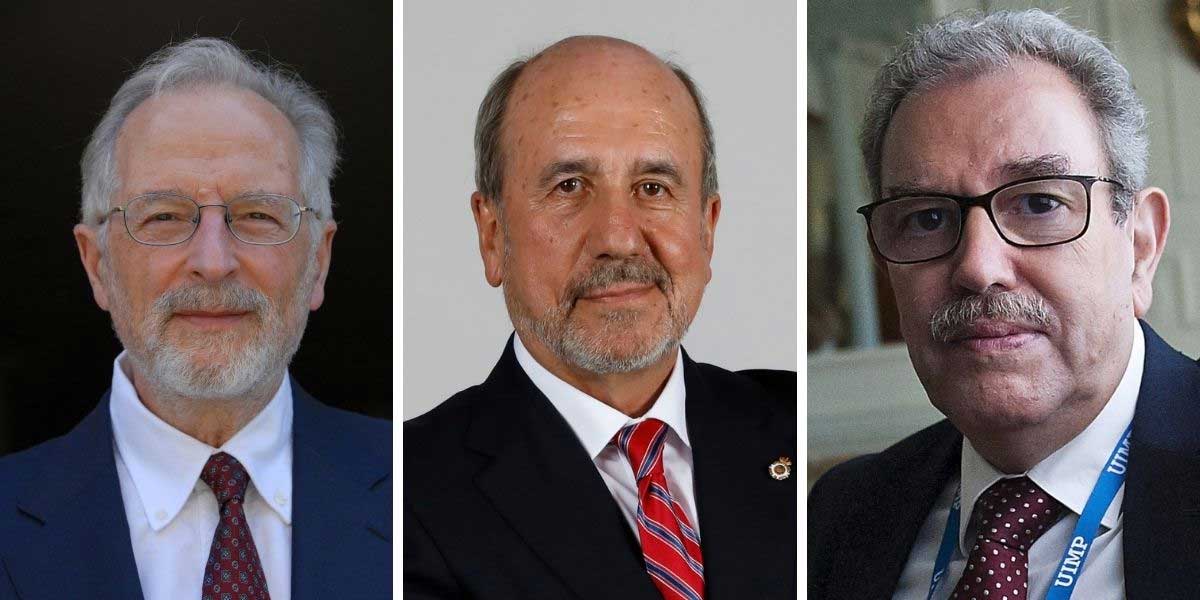
Speakers: Dr. Luis Enjuanes, Dr. Mariano Esteban and Dr. Vicente Larraga.
degree scroll de la lecture: "La research biomédica al servicio de las personas".
Day: 25 February.
Time: 10:00h.
Place: auditorium of Sciences Building.
Description:
Luis Enjuanes has worked in the field of virology for more than 40 years, including more than 35 years on coronaviruses. Enjuanes has published more than 235 articles in international journals and 58 book chapters. He is currently Professor of research and Head of the Coronavirus laboratory at the National Biotechnology Centre of CSIC. Enjuanes has been a Fogarty Visiting Fellow at the National Institutes of Health (NIH) in the USA, and a Visiting Scientist at the National Institutes of Health (NIH) Cancer Research Center (FCRC). Enjuanes is Professor of Virology at the Autonomous University of Madrid and at the high school Pasteur in Paris. He has been named "Distinguished Senior Virologist" by the Spanish Society of Virology, Academician of the Royal Academy of Exact, Physical and Natural Sciences, and Academician of the "North American Academy of Microbiology". During the year 2021 Luis Enjuanes has been appointed International Member of the US National Academy of Sciences (NAS). Enjuanes has received the Medal of Merit in the research and in the University Education awarded by the Ministry of Science and Innovation. He is an Expert Consultant for the NIH and the World Health Organization.
Mariano Esteban degree program has developed his research knowledge on the molecular biology of pathogens such as viruses, to develop procedures for the control of infectious diseases. His discoveries on the biology of the vaccine virus that was used as a vaccine to eradicate smallpox have helped him to generate possible vaccines against AIDS, Malaria and Leishmania, and he has been a pioneer in the field of vaccines by developing combined vector immunisation procedures. Esteban is Professor of research at the National Biotechnology Centre (CSIC). His scientific contributions represent 240 papers published in international journals and six patents. He has obtained several scientific distinctions, among them, the award of the committee of New York Health, award of the State University of New York, Pharmacist of the Year. award IBERDROLA of Science for Visiting Professors. He was founder and President of the first association of Spanish professionals abroad, association of Spanish Graduates and Doctors in the United States (ALDEEU). He is founder and member of the European AIDS Foundation (EuroVacc). In 2006 he was appointed Academician of issue of the Royal National Academy of Pharmacy.
Vicente Larraga Rodríguez de Vera has developed his scientific degree program on the structure and function of biological membranes and cell activation mechanisms in bacteria and eukaryotic cells at the committee Superior de Investigaciones Científicas (CSIC). She is manager of the laboratory of Molecular Parasitology and Vaccines of the Centro de Investigaciones Biológicas-Margarita Salas of the CSIC. For the last thirty years, she has been working on the development of recombinant vaccines against Leishmania infantum infection and on the mechanisms of protection against the parasite in its main host, the dog. He has succeeded in developing a recombinant DNA vaccine against leishmaniasis (last EMA (European Medicines Agency) license in February 2021). He is currently developing a synthetic DNA vaccine against SARS-Cov-2. He has been Vice-President of the CSIC and director of the Centro de Investigaciones Biológicas-MS in Madrid. He has published numerous papers in books and international journals (including: Nature, Proc Nat Acad.Sci USA, Lancet, Nuc. Ac. Res., etc). He is a member of several scientific societies, including the New York Academy of Sciences, the Spanish Society of Biochemistry and Molecular Biology and the Spanish Society of Tropical Medicine and International Health. He is a member of the Royal National Academy of Pharmacy.
 speakerFrancisco Ortigosa
speakerFrancisco Ortigosa
degree scroll of the lectureSmall Data to Big Data: 15 years of Digital Transformation of Geosciences in Repsol".
Day11 November
Time: 12:00h.
Location: auditorium of the Sciences Building
Description: Francisco Ortigosa has dedicated 32 years to the petroleum industry holding several international technology positions in Repsol. He has particularly focused on the economic value added to the Exploration & Production Business by new technologies in the field of Geoscience. As Director of Geoscience Technology in the Repsol's he has led the development of new digital technologies in the field of Geosciences. Francisco has received an award from IEEE Spectrum in 2008 for the Kaleidoscope Project recognizing one the most innovative projects of the year 2007, and another award from Platt's (Standard & Poors) recognizing the most Commercial Technology of the year in 2009. Currently he hols the position od Director Innovation Technology expanding his areas of influence to Innovation in Upstream, Downstream, Energy Transition and Digital Transformation. Francisco has positions in Boards and Technology Boards of companies where he advises in Technology Strategy and New Technologies. In 2018 he received the Repsol's INN Award recognizing the innovative projects developed in his area. Recently he has received the Repsol's Digital Legend Award recognizing his successful trajectory in Digital Transformation and Big Data in the last 15 years. He has authored and co-authored numerous technical papers presented in International Conferences and Publications. He is also frequent Key Note speaker in Conferences, and a regular participant in panels regarding Digital Transformation in the Oil Exploration & Production Business. Francisco is affiliated with SEG, EAGE and SPE.
 speaker: Stefano Boccaletti
speaker: Stefano Boccaletti
degree scroll of the lecture: "Structure and function of complex networks: from applied mathematics to the real world".
Day: 26 March
Time: 12 h.
Venue: auditorium del Sciences Building
Invitation (.pdf)
Description
researcher Senior. CNR Institute of Complex Systems in Florence (Italy), Stefanno Boccaletti is Honorary Professor at Northwestern Polytechnical University, Xi'an (China) and Tel Aviv University (Israel).
D. in Physics from the University of Florence. In 1998 he joined the University of Navarra and obtained the scholarship Marie Curie of the European Community until the year 2000, being the first scholarship recipient of this level in the academic centre of Navarra. At the end of his scholarship, he remained as Professor until March 2001. During his time at the University of Navarra, his research work stood out, and with only 3 of his published articles he achieved more than 2,500 citations in prestigious international journals.
CV of Stefano Boccaletti (.pdf)
Professor Joe McBride
-
16 November. 12.00 noon - auditorium - Hexagon Building
Implications of climate change on urban forests
Professor McBride's research currently focuses on the implications of climate change on the composition, structure and function of so-called urban forests in California. Other recent lines of research have included (1) the role of urban forests in reducing air pollution in China (2) the composition, structure and function of urban forests in different biomes (3) the role of fire in riparian forests in the Sierra Nevada, California (4) wind patterns, microclimates and windthrow risk in urban areas.
Professor McBride's professional projects include the management Vegetation Plan for Sea Ranch, Sonoma County, California; the management Urban Tree Plan for the historic Presidio of San Francisco; the Restoration Plan for the Sutro Baths, GGNRA, in San Francisco; and the Oak Grove Restoration Plan for the reservation Academic Oak Grove at Stanford University, Palo Alto, California. Professor McBride is chair of the Forest Science Division of the department Environmental Science, Policy and management. His work professor is complemented by his work for over 40 years as consultant in forestry and landscape ecology at area in the San Francisco Bay Area. His work of consultancy service focuses on vegetation analysis and planning at management . His clients include federal, state, county and city agencies, legal firms, corporate and private landowners, and foreign governments.
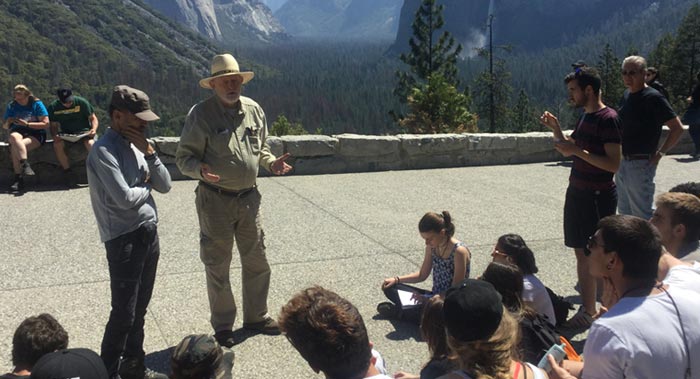
Professor McBride together with the students of the Degree Environmental Sciences and the double Degree with Biology from the Environmental and Landscapes Program.
Professor Xavier Bellés
-
Professor of research. high school of Evolutionary Biology. CSIC-Universitat Pompeu Fabra (Barcelona).
-
Member of the Institut d' Estudis Catalans, of the Royal Academy of Sciences and Arts of Barcelona and of the Royal Academy of Exact, Physical and Natural Sciences.
-
Honorary Member of the Spanish Society of Evolutionary Biology
-
award of Scientific Literature of the Fundació Catalana per a la Recerca
19 April 2018, 12h. Sciences Building of the University of Navarra.
lecture : "Living two lives: a walk through the metamorphosis of insects".
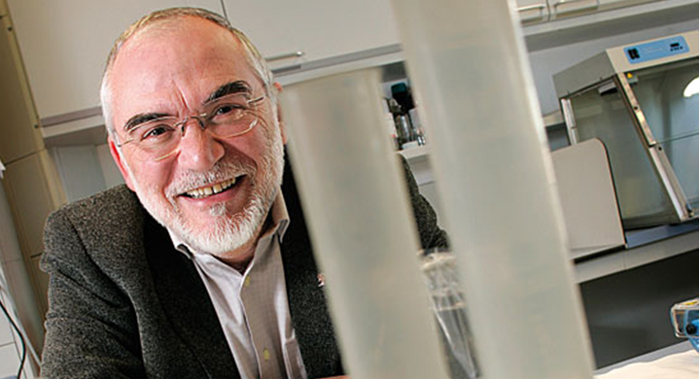
Xavier Bellés Ros (Barcelona, 1952) is graduate and holds a PhD in Biology from the University of Barcelona, specialising in entomology. He was the founder (2008) and first director (2008-2017) of the high school of Evolutionary Biology (CSIC-Universitat Pompeu Fabra, Barcelona). Between November 2004 and June 2008 he was coordinator of the area of Natural Resources of the CSIC. He is a full member of the Institut d' Estudis Catalans, of the Real Academia de Ciencias y Artes de Barcelona and a corresponding member of the Real Academia de Ciencias Exactas, Físicas y Naturales. He has been appointed honorary partner of the Spanish Society of Evolutionary Biology. He is publisher of the journal Animal Biodiversity and Conservation, Review publisher of Frontiers in Endocrinology and team member publishing house of several scientific journals included in the Science Citation Index (Insect Biochemistry and Molecular Biology, Journal of Insect Physiology, Archives of Insect Physiology and Biochemistry, European Journal of Entomology, Physiological Entomology, Insect Science and Current Opinion in Insect Science).
His current lines of research focus on the study of the evolution of insect metamorphosis, from the morphological to the molecular scale. His scientific career is reflected in the publication of 19 books and 318 scientific articles. He devotes his free time at work in the field of experimental and taxonomic entomology to the scientific knowledge dissemination and to the study of the history of science. In the field of knowledge dissemination he has published books such as: "Entendre la biodiversitat" (La Magrana, Barcelona, 1996), "Supervivientes de la biodiversidad" (Rubes, Barcelona, 1998), or "El Bestiari, animals i símbols en un llibre medieval" (Dalmau, Barcelona, 2004). Among other awards, he has received the award Prix Maurice et Therèse Pic de la Société Entomologique de France (1985) and the award de Literatura Científica de la Fundació Catalana per a la Recerca (2003), for his book "El teatre del sin sectes". In 2009 he received the Bronze Prisma of the Casa de las Ciencias (A Coruña), for his scientific work knowledge dissemination .
Dr. Osvaldo Peinado. Head of Ground Operations. German Space Operations Center (GSOC). German Aerospace Center (DLR).
27 November 2017, 12 noon. Sciences Building of the University of Navarra.
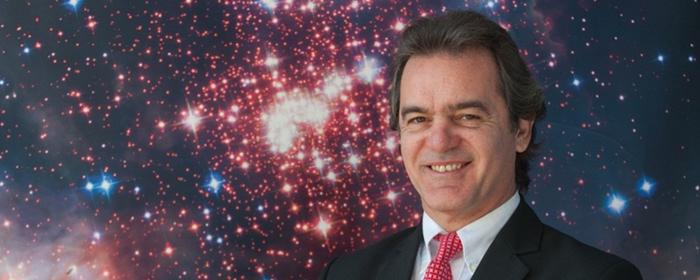
Osvaldo Peinado (Mendoza, Argentina, 1966) holds a degree in Computer Science and Electronics Engineering from the University of Mendoza (Argentina) and a PhD from the University of Munich (Germany). In 1988 he started working at the Argentinean Meteorological Service and in 1991 at the Argentinean Space Agency with optical remote sensing sensors.
In 1995, he joined the Environmental Research Center in Leipzig (Germany) to work with sensors subject radar and geographic information systems. In 2000 he started at the German Aerospace Centre (DLR) and in 2003 he continued at the German Space Operations Centre (GSOC), where he worked on the Columbus (first European permanent installation in space) and ATV (Automated Transfer Vehicle) projects, as one of the two heads of Ground Operations. In 2008 he became a member of the committee Advisory Committee for data Systems in Space (CCSDS) and since then he leads the group of work Voice and Video and is, since 2013, part of the committee of management of this committee. Since 2015, he has been working at the German Space Operations Centre (GSOC) as Head of Ground Operations.
Dr. Alfonso V. Carrascosa. researcher Scientist of the National Museum of Natural Sciences (CSIC). award Candia, Gold Medal of Merit of the research Oenology (2007), award of the Royal Galician Academy of Sciences 2009 and award International Oenology OIV (2011).
4 April 2017, 12 noon. Sciences Building of the University of Navarra.
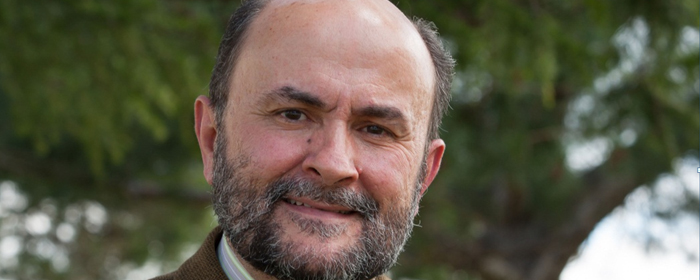
Alfonso V. Carrascosa Santiago (Madrid, 1961) holds a PhD in Biological Sciences from the Complutense University of Madrid, is qualified to practice the profession of oenologist, and is a scientist at the CSIC, with a post at the National Museum of Natural Sciences (MNCN).
He has been a lecturer at the Universidad Autónoma de Madrid and has collaborated with important institutions related to food safety such as ENAC or AENOR, as well as with management of the industrial research such as the CDTI. Co-author of several patents transferred to companies, of more than 100 scientific articles in SCI journals, and of several books, he received, together with his colleagues, the award Candia 1991, the Gold Medal of Merit of the research Oenology 2007, the award of the Royal Galician Academy of Sciences 2009 and the award International Oenology OIV in 2011.
At his current post, the MNCN, he is part of the group "History and documentation of Natural Sciences in Spain". He also coordinates the group "Historia de la Microbiología Española" of the Spanish Society of Microbiology (SEM), is the editor of the journal Arbor and biographer of the Royal Academy of History. director of the journal Arbor and biographer of the Royal Academy of History. He has been founder and director of the "group de Microbiología y Biocatálisis de los Alimentos" of the high school de research de Ciencias de la Alimentación (CIAL) of the CSIC and the Universidad Autónoma de Madrid. In recent years, as part of his work at the Museum of Natural Sciences, he has collaborated with different national media, carrying out various scientific programmes on knowledge dissemination .
I Albareda Lecture
Professor Avelino Corma. Polytechnic University of Valencia, award Príncipe de Asturias de research Científica y Técnica 2014.
29 September 2016, 11h. - Sciences Building of the University of Navarra
Avelino Corma (Moncófar, Castellón, Spain 1951) is Professor at research; since 1990 he has been carrying out his scientific work at the high school de Tecnología Chemistry ITQ (CSIC/UPV), research center , a joint centre created in 1990 by the Universitat Politècnica de València (UPV) and the committee Superior de Investigaciones Científicas (CSIC).
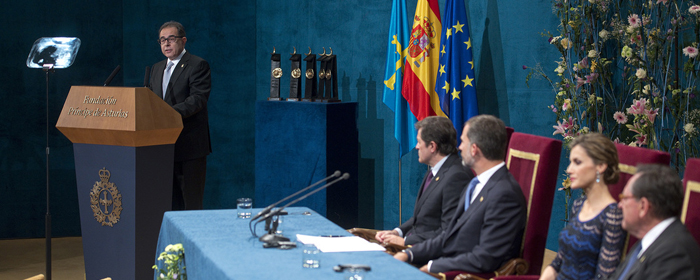
Prince of Asturias Awards Ceremony submission
2014 © FPA /Iván Martínez
Avelino Corma did his licentiate degree in Chemical Sciences at the University of Valencia and his doctorate at the Complutense University of Madrid, his thesis was developed under the direction of Prof. Antonio Cortés at the high school of Catalysis and Petrochemistry (CSIC), followed by a two-year postdoctoral stay at Queen's University (Canada).
Prof. Corma is an internationally recognised expert in solid acid and bifunctional catalysts applied to petroleum refining, petrochemical and chemical processes, especially in the synthesis and application of Zeolites. He is one of the most cited scientists in the world(HCR). He has published more than 1000 papers in international journals, written three books and numerous reviews. He is a member of the committee Editorial Board of the most important journals in the field of catalysis, he is the author of more than 100 patents, a dozen of which have been industrially applied in commercial processes of cracking, desulphurisation, isomerisation, epoxidation and chemoselective reactions of oxidation of alcohols and hydrogenation.
Prof. Corma has received important national and international awards for his important work work researcher among which we could highlight the award Príncipe de Asturias de research Scientific and Technical (2014), the Medal of Honour for the Promotion of Invention of the García Cabrerizo Foundation (Spain) (2012) or the Grand Medal of the French Academy of Sciences (2011), and recently the award Spiers Memorial 2016 of the Royal Society of Chemistry of the United Kingdom associated with his intervention in the prestigious Fadaray Discussion.
Press kit
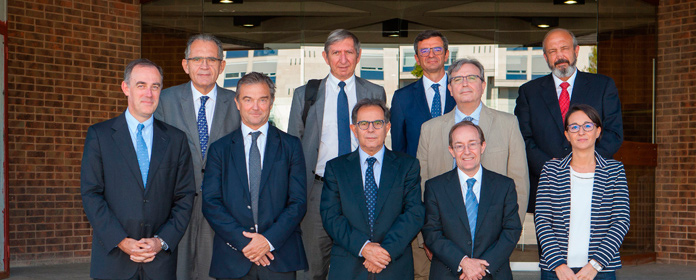
o Diario de Navarra
o Navarra News
o Navarra.com
o Navarra información - 2016/09/26
o Navarra información - 2016/09/27
o Pamplonaactual
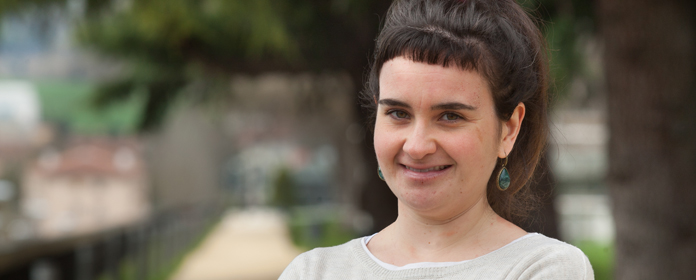
o 2016/03/04: research unravels the role of humus in plant growth
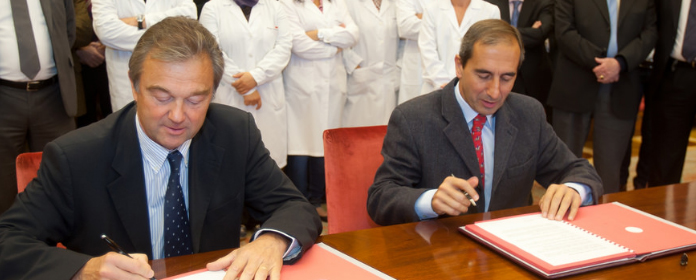
o 2015/10/15: Constitution of the agreement between group Roullier and the University of Navarra and of the Chair Timac Agro-University of Navarra
See news - Photo gallery


